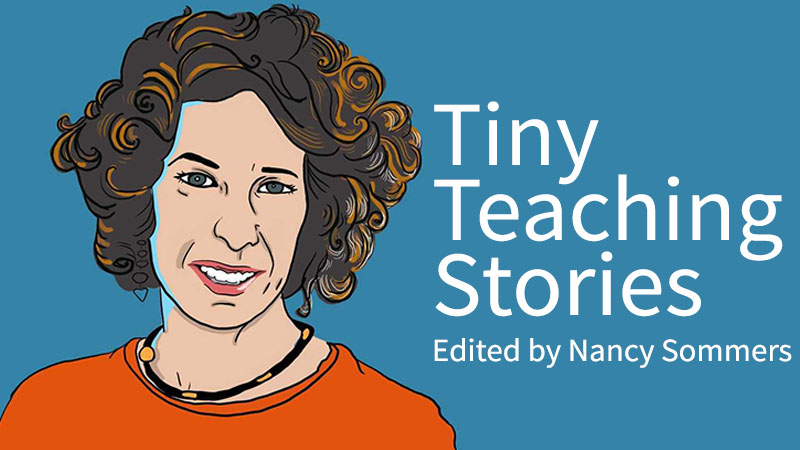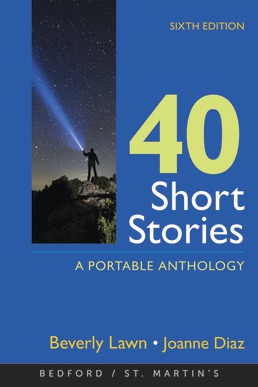-
About
Our Story
back- Our Mission
- Our Leadershio
- Accessibility
- Careers
- Diversity, Equity, Inclusion
- Learning Science
- Sustainability
Our Solutions
back
-
Community
Community
back- Newsroom
- Discussions
- Webinars on Demand
- Digital Community
- The Institute at Macmillan Learning
- English Community
- Psychology Community
- History Community
- Communication Community
- College Success Community
- Economics Community
- Institutional Solutions Community
- Nutrition Community
- Lab Solutions Community
- STEM Community
- Newsroom
- Macmillan Community
- :
- English Community
- :
- Bits Blog
- :
- Bits Blog - Page 3
Bits Blog - Page 3
Options
- Mark all as New
- Mark all as Read
- Float this item to the top
- Subscribe
- Bookmark
- Subscribe to RSS Feed
Bits Blog - Page 3
Showing articles with label Virtual Learning Resources.
Show all articles
Macmillan Employee
12-09-2020
11:38 AM
In today's "What We've Learned" video, Lauren Springer, one of the authors of Science and Technology, discusses the need to shape students' expectations of what online learning entails and how it compares to in person classes.
... View more
Labels
-
Composition
-
Virtual Learning Resources
0
0
1,383
Macmillan Employee
12-07-2020
10:00 AM
In today's "What We've Learned" video, Lauren Springer, one of the authors of Science and Technology, discusses the strategies she's learned for reaching out and ensuring all students receive the information they need to succeed during the pandemic.
... View more
Labels
-
Composition
-
Virtual Learning Resources
0
0
1,215
Macmillan Employee
12-02-2020
10:00 AM
In today's "What We've Learned" video, Barclay Barrios (@barclay_barrios), author of Emerging and Intelligence, reflects on the transitions happening in higher education, the permanence of online education, and the opportunities to create an education system that is inclusive and safe for students of all backgrounds, identities, and beliefs.
... View more
Labels
-
Composition
-
Virtual Learning Resources
0
0
1,361
Macmillan Employee
11-30-2020
10:00 AM
In today's "What We've Learned" video, Barclay Barrios (@barclay_barrios), author of Emerging and Intelligence, discusses the complications of planning for and setting up online classes, and of accounting for factors outside of student or instructor control - such as the weather's effect on internet access.
... View more
Labels
-
Composition
-
Virtual Learning Resources
1
0
1,365
Macmillan Employee
11-23-2020
10:00 AM
In today's "What We've Learned" video, April Lidinsky (@april_lidinsky), one of the authors of From Inquiry to Academic Writing: A Text and Reader , reflects on instructor support communities, being available for students, and take care of oneself.
... View more
Labels
-
Composition
-
Virtual Learning Resources
0
0
1,393
Macmillan Employee
11-18-2020
10:00 AM
In today's "What We've Learned" video, April Lidinsky (@april_lidinsky), one of the authors of From Inquiry to Academic Writing: A Text and Reader, emphasizes the importance of community-building in composition classrooms, and offers strategies for creating a sense of community in synchronous remote classes using Zoom.
... View more
From Inquiry to Academic Writing: A Text and Reader


Stuart Greene; April Lidinsky
From Inquiry to Academic Writing: A Text and Reader
English
Labels
-
Composition
-
Virtual Learning Resources
1
2
2,133
Macmillan Employee
11-16-2020
10:00 AM
In today's "What We've Learned," Mike Palmquist, author of Bedford Researcher, discusses the benefits of labor-based grading, and how the process of integrating knowledge can lead to a short-term decrease in performance, but a long-term gain for students.
... View more
Labels
-
Composition
-
Virtual Learning Resources
1
0
1,411
Macmillan Employee
11-11-2020
10:00 AM
In today's "What We've Learned," Mike Palmquist, author of Bedford Researcher, reflects on teaching in-person during the pandemic: how he's had to rethink class discussion, group work, and seating, as well as the challenges of parsing student expressions under masks.
... View more
Labels
-
Composition
-
Virtual Learning Resources
0
0
1,040
Macmillan Employee
11-09-2020
10:00 AM
In today's "What We've Learned," Erica Duran, one of the authors of Science and Technology, discusses the challenges of motivating students remotely, identifying why students might be struggling, and supporting students through personal challenges by offering understanding, care, and the resources they need.
... View more
Labels
-
Composition
-
Virtual Learning Resources
0
0
1,912
Macmillan Employee
11-04-2020
10:00 AM
In today's "What We've Learned," Holly Bauer, author of Food Matters, reflects on using shared documents for group annotation, as a way to improve students' understanding and to encourage participation.
... View more
Labels
-
Composition
-
Virtual Learning Resources
0
0
1,274
Macmillan Employee
11-02-2020
10:00 AM
In today's "What We've Learned," Samuel Cohen, author of 50 Essays, reflects on ways to make connections with students when teaching online, and how to bring their daily lives into the classroom.
... View more
Labels
-
Composition
-
Virtual Learning Resources
1
0
1,369
Macmillan Employee
10-28-2020
10:00 AM
In today's "What We've Learned," Elizabeth Losh and Jonathan Alexander, authors of Understanding Rhetoric, discuss how to use Zoom's breakout room feature to give students agency and engagement in remote instruction.
... View more
Understanding Rhetoric


Elizabeth Losh; Jonathan Alexander; Kevin Cannon; Zander Cannon
Understanding Rhetoric
English
Labels
-
Composition
-
Virtual Learning Resources
0
0
1,122
Macmillan Employee
10-26-2020
10:00 AM
Welcome to the first "What We've Learned" video! In these videos, Macmillan authors reflect on the insights, lessons, and tricks they've learned through teaching online, and how their teaching pedagogies have adapted to digital instruction.
Here, Elizabeth Losh and Jonathan Alexander, authors of Understanding Rhetoric, discuss making spaces for student writers and the opportunities for student interaction in both synchronous and asynchronous online instruction.
... View more
Understanding Rhetoric


Elizabeth Losh; Jonathan Alexander; Kevin Cannon; Zander Cannon
Understanding Rhetoric
English
Labels
-
Composition
-
Virtual Learning Resources
0
0
1,713
Author
10-19-2020
01:40 PM
Painting: "Colossus," courtesy of Scott Reamer When COVID-19 hit in February, I was teaching a new version of my introduction to 21st century literature class entitled, “Writing after the End of the World.” The organizing question for this course is/was: “how does writing change when it is produced in the wake of a dying world?” When I started the class in January, of course, COVID wasn’t part of the general discourse, so my opening brainstorming session on the ways in which writing in 2020 could be described as “after the end of the world” didn’t include, “writing after the end of the world that existed pre-COVID.” As it was, we didn’t lack for ways to say that writing in 2020 was writing produced after the end of other worlds: after the pre-9/11 world, the world not fated to be consumed by global warming, the world not defined by endless war, the world guided by Enlightenment thought, the world were Martin Luther King’s dream seemed achievable, the world of gainful employment, the world where students weren’t expendable resources in classroom massacres. We talked about the sense that the clock counting down to human extinction has been irreversibly accelerated by the global reliance on fossil fuels. The discussion of these possibilities served as a prelude to our semester-long project considering creative acts at a time when the prospect of an inviting future seemed all but unimaginable. And this was before classes were suspended and everyone sent home. I know that sounds like a deadly way to begin a course, but talking openly about these things is actually a relief for students and their teacher. Acknowledging how awful things have become during the first two decades of the 21st century is both cathartic and essential for understanding the literatures produced during this time—our time. As planned, my course invites the students to consider the following bind: if you can’t imagine a better future, you can’t work towards creating a better future. To move from cataloguing the catastrophic state of the world to fashioning a way forward into the unknown, I tell the students, we have to reclaim the powers of our imagination, with which we all are endowed by virtue of our humanity. By structuring the course in this way, I mean for it to serve as a sustained engagement with uncertainty, complexity, ambiguity, shades of meaning, and the alternate worlds of the future that can be created by our actions in the present. We were halfway through the semester, in the midst of reading Ruth Ozeki’s A Tale for the Time Being, when it became clear that the spring semester was going to be disrupted by the global pandemic. What to do? Initially, I was filled with despair when commanded from on high to move the remainder of the course, along with my 90 students, two co-teachers, and two undergraduate course assistants, online. The transition promised to ruin the course, as I’d imagined it, for at least three reasons. First, the course was designed as a face-to-face experience: attendance is required; the lectures are interactive; minds get changed as student participation increases. None of that could happen online. Second, I use persistent assessment, with a quiz at the beginning of each class, to provide a classroom where all students are prepared to respond to the lectures and contribute to the discussion. My course design is premised on my definition of work in the humanities as an embodied experience of contact through language. Online, we’d be disembodied and quizzes at the beginning of each scheduled session would be rendered meaningless by the fact that they occurred in an unmonitored virtual space. Finally, I disallow technology in all of my classes to give my students a space to reclaim the ability to pay attention, to experience what becomes possible when the myth of multitasking is set aside and in its place there is the struggle to concentrate, to stay focused, to think, perhaps for the first time. Online, the discussions, the lectures, and the readings themselves would all be contending with all the distractions that arise the moment one opens one’s browser. For these reasons, and more, I figured the students and I were simply going to have to pretend that the course still existed, when circumstances had, in fact, transformed it into a shadow of its former self. This is part of my own creative process, alas. I rage; I rail; I shake my puny fist at the heavens. And then, remembering finally that every disaster is also an opportunity to create anew, I settle in and begin imagining a way forward. In this instance, I decided, after reflecting on a student’s response to my draft replacement syllabus, that the class would try to take advantage of this unanticipated calamity. We’d continue reading and discussing examples of writers experimenting with ways to end their stories in times where the future seems both unknown and threatening. But we’d shift, in the final three weeks of the course, from being readers to being writers. In the process, we’d build a Digital Decameron for the 21st century, collecting a range of ways people living through a pandemic were responding to the situation–with stories, songs, videos, research papers, advice, poetry, and more. In this series of blog posts, I want to reflect on what my students produced over those three weeks as they assumed the responsibility for writing after the end of the world. The central paradox that interests me is this: how was it that students in a gen ed lecture class focused on reading ended up producing some of the best writing I’ve received in twenty-eight years (nearly all spent teaching writing!)? The website where all this work is collected is: https://www.digitaldecameron.com/ (Readers who want to learn more about the course and what decisions I made along the way while teaching it should proceed to the Teaching in Public section of the Digital Decameron website.)
... View more
Labels
-
Composition
-
Virtual Learning Resources
0
0
1,149
Macmillan Employee
10-09-2020
11:22 AM
Teaching Introduction to Literature, and wondering how to get your students excited about poetry? Today, we're highlighting a podcast that might help: Poetry for All, a podcast hosted by Joanne Diaz and her colleague Abram Van Engen.
Perfect both for those who already love poetry, and those who are just beginning to explore the genre, the podcasts helps students get their bearings with a poem, giving them insight into working with and analyzing poetry. Joanne and Abram devote each 15-minute episode to reading a poem, discussing it, and then reading it again. Thus far, they have discussed poems by Seamus Heaney, Emily Dickinson, Phillis Wheatley, William Shakespeare, Claude McKay, and Jen Bervin.
Upcoming episodes will focus on poems by Anne Bradstreet, John Donne, Honorée Fannone Jeffers, and Toi Derricotte.
Joanne Diaz is a Professor of English at Illinois Wesleyan University, and one of the authors of Literature: A Portable Anthology, Reading and Writing about Literature, and 40 Short Stories: A Portable Anthology.
... View more
Literature: A Portable Anthology


Janet Gardner; Joanne Diaz; Beverly Lawn; Jack Ridl; Peter Schakel
Literature: A Portable Anthology
English
Labels
-
Instructor Resources
-
Literature
-
Virtual Learning Resources
0
0
4,750
Topics
-
Achieve
1 -
Bedford New Scholars
56 -
Composition
584 -
Corequisite Composition
56 -
Developmental English
38 -
Events and Conferences
13 -
Instructor Resources
11 -
Literature
53 -
Professional Resources
7 -
Virtual Learning Resources
46
Popular Posts














